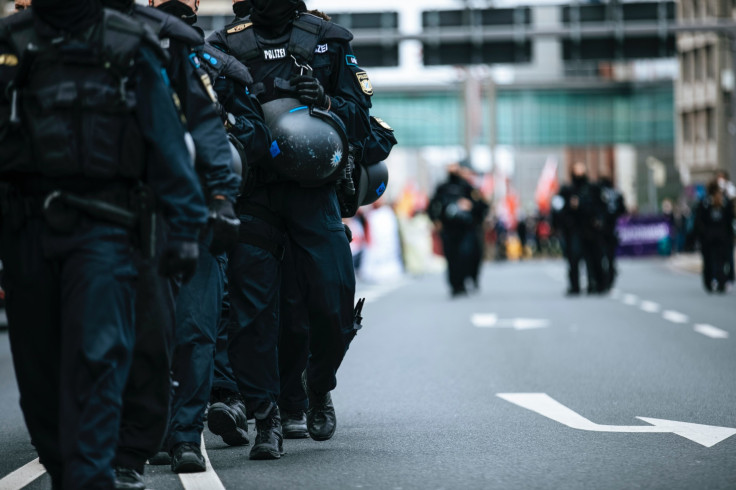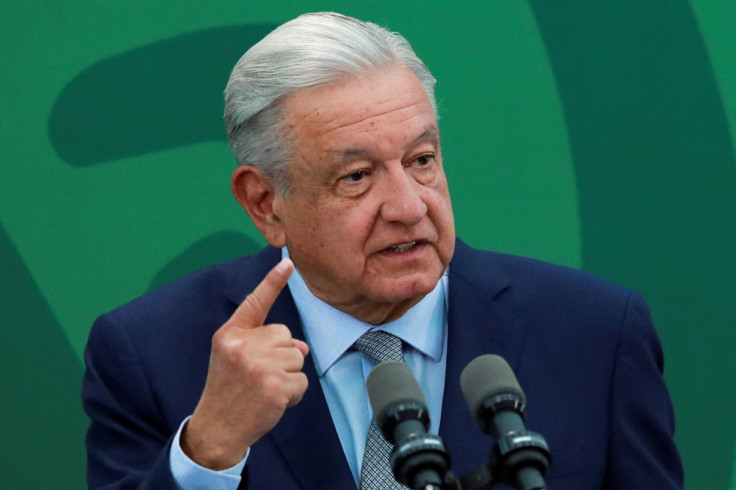
Mexico City, Mexico -- A nine-year-old girl was shot and killed by Mexican National Guard officers in San Luis Potosí, in central Mexico. Guard members reportedly opened fire when the car carrying the little girl and her family failed to stop at a highway checkpoint in the early hours of the morning. Two guard members have been arrested for the July murder.
The tragic shooting has further illustrated the increased militarization of Mexico's civilian-led National Guard during the presidency of Andrés Manuel López Obrador. His protegé and successor, President-elect Claudia Sheinbaum, as well as ruling MORENA party officials, look to further the convergence of the scandal-ridden body with the military as the party prepares a bill to integrate the Guard into the Army, something that has drawn concern from human rights groups
"We are certain that [the murder of the nine-year-old girl] is due to the military logic that members of the National Guard operate. The training of a soldier is not the same as that of a police officer," Neftali Perez Rodriguez, a lawyer at the Miguel Agustín Pro Juárez Center for Human Rights (Centro Prodh) told The Latin Times.
Perez Rodriguez said that military logic is "heavily focused on eliminating the enemy" whereas logic for public servants like police forces -- when properly trained -- "is to regulate the use of force, to use it in a proportionate and balanced manner."
López Obrador created the National Guard in 2019 as a civilian-led body intended to replace the military for public security duties -- one of his campaign promises. However, since its inception, the National Guard has been under military command.
Most of its troops came from within different branches of the military despite a law establishing the Guard as a civilian body under civilian command and doctrine. Although currently under the control of the Secretary of Citizen Protections and Security, the institution in charge of Mexico's police force, 80% of the National Guard's nearly 130,0000 troops are military members as of today.
The army also oversees the National Guard officers' administration, training, and recruitment.
If López Obrador's reform is approved, the National Guard will fall under the Army's control, the last of its civilian commands will be eliminated, and all its troops would be subject to the military justice system. This could potentially shield officers who have committed crimes from being prosecuted inside civilian courtrooms.

"By transferring the National Guard to the army, civilian controls over this institution are diluted, as is currently the case with the army. And then, in the absence of controls, it is more likely that this authority will commit human rights violations without any consequences," explained Rodríguez.
A history of human rights violations
As the peacekeeping task force destined to replace the military, the National Guard has a history of severe human rights violations and using lethal force against unarmed civilians.
For instance, in April 2022, agents in Irapuato, Guanajuato, shot and killed 19-year-old student Angel Yael Ignacio Rangel. A year later, National Guard officers fired at a vehicle, resulting in the death of a 15-year-old pregnant girl, along with her unborn, eight-month-old child.
Instances of torture and corruption have also been widely reported.
In recent months, the Guard has been under heavy criticism following a March 31 massacre in Chiapas, southeastern Mexico, where alleged criminals clashed with National Guard troops, resulting in the deaths of 25 people, including women and children. Human rights organizations like Fray Bartolomé de las Casas (Grupo Frayba) have called for an investigation into the incident and demanded a review of the events amid concerns over the possible execution of civilians during the confrontation.
The growing record of human rights abuses and crimes committed by National Guard officers worry human rights groups since prosecuting a military officer suspected of a crime is more challenging given the discretionary nature of the military.
Mexico has experienced harrowing cases of crimes committed by the military, including the mass disappearance of 43 students in Iguala, Guerrero, in 2014. Classified by Mexico as a state crime in 2022, military officers are accused of abducting and disappearing the students from a rural teacher's college and covering up the evidence to protect military officials.
Similarly, the National Guard has also been criticized for its lack of transparency. From 2019 to 2021, the National Human Rights Commission (CNDH) issued 400 complaints against the National Guard over alleged cases of abuse. However, the federal body only acknowledged excessive use of force on one occasion, and classified the documents regarding the alleged human rights violations for five years.
The reform will also expand the National Guard's powers and duties. The bill presented by López Obrador and upheld by Sheinbaum will empower National Guard officers to conduct police investigations and tasks, effectively turning police inquiries into military operations, according to critics.
Frayba has reported harassment and abuses by National Guard troops stationed in Chiapas, southeastern Mexico.
In October 2020, Indigenous Mayan land defenders demonstrated against the construction of a National Guard barracks in northern Chiapas. Around 300 troops and police officers were deployed to dismantle the protest; 11 people were injured, and land defenders Cesar and Jose Luis were apprehended and tortured, according to Frayba.
Past attempts by López Obrador to militarize the National Guard have failed to pass the Supreme Court, with judges ruling the president's reform unconstitutional last year. However, López Obrador's party, MORENA, made significant gains in the June 2 general elections, achieving an overwhelming majority in Congress as well as securing the presidency. These political victories could tip the scale in favor of the outgoing-president's ambition to reform the Guard.
"What we have seen in Mexico is that the only thing militarization has caused is an increase in human rights violations committed by these authorities because of those of the Armed Forces and that the situation of generalized insecurity in the country continues," Rodríguez concluded.
© 2024 Latin Times. All rights reserved. Do not reproduce without permission.







